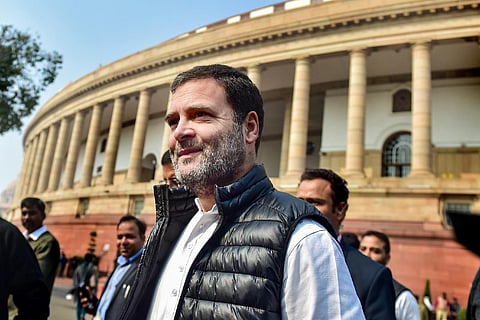

Congress leader and Member of Parliament (MP) from Wayanad, Rahul Gandhi, on Tuesday, March 23, was convicted in a criminal defamation case filed for his statement from 2019. A Gujarat court that found him guilty sentenced him to two years imprisonment. Further, his sentence was suspended for 30 days and he was granted bail. This conviction has raised a crucial question regarding his position as the MP, which is governed by The Representation of the People Act of 1951.
Rahul's disqualification as an MP is based on two things: The Representation of the People Act of 1951 and a 2013 judgement by the Supreme Court titled Lily Thomas Vs Union of India and Others.
Constitutional expert Subhash C Kashyap said that the implementation of the punishment awarded to Rahul Gandhi has been suspended for 30 days, which gives him time to appeal in a higher court. “This also means that he might not be disqualified immediately. His sentence was suspended and he also got bail. He will have to go to higher courts and appeal the judgement as a whole,” he said.
The disqualification of any representative – Member of Parliament or Member of Legislative Assembly – is governed by The Representation of the People Act, 1951 (RPA). Section 8 of the Act deals with disqualification of an MP or MLA on conviction for certain offences. A person shall be disqualified if they are booked for any of the offences listed in the section:
> Promoting enmity between different groups on ground of religion, race, place of birth, residence, language, etc., and doing acts prejudicial to maintenance of harmony - section 153A of IPC
> Bribery - section 171E of IPC
> Undue influence or personation at an election - section 171F of IPC
> Offences related to rape - section 376, 376A, 376B, 376C, 376D of IPC
> Cruelty towards a woman by husband or relative of a husband - section 498A of IPC
> Making statement creating or promoting enmity, hatred or ill-will between classes or relating to such statement in any place of worship or in any assembly engaged in the performance of religious worship or religious ceremonies - section 505 of IPC
> Preaching and practice of untouchability, and enforcing any disability arising therefrom - Protection of Civil Rights Act, 1955
> Importing or exporting prohibited goods - section 11 of the Customs Act, 1962
> Being a member of an association declared unlawful; dealing with funds of an unlawful association; relating to contravention of an order made in respect of a notified place - sections 10 to 12 of the Unlawful Activities (Prevention) Act, 1967 (UAPA)
> Committing terrorist acts - section 3 of the Terrorist and Disruptive Activities (Prevention) Act, 1987
> Committing disruptive activities - section 4 of the Terrorist and Disruptive Activities (Prevention) Act, 1987
> Foreign Exchange (Regulation) Act, 1973
> Narcotic Drugs and Psychotropic Substances Act, 1985
Apart from this, a person can be disqualified if they are convicted for violating any law that prevents hoarding or profiteering; any law relating to the adulteration of food or drugs; or any provisions of the Dowry Prohibition Act. Any person convicted of any offence and sentenced to imprisonment for not less than two years, for any other offences other than those mentioned above, will be disqualified from the date of the conviction and be disqualified for six years since their release.
In the 2013 judgement titled Lily Thomas Vs Union of India and Others, the Supreme Court repealed section 8(4) of the Act that had a provision for representatives not to be disqualified for three months even if they were convicted. Section 8(4) had stated that if a person was an MP or MLA on the date of the conviction, their disqualification will not come into force until three months from the date of conviction. Further, if an appeal is filed, then they will not be disqualified until the appeal is disposed of. The court, through the 2013 judgement, struck down this section and declared it “ultra vires of the Constitution.”
The then Congress-led United Progressive Alliance (UPA) government passed an ordinance to overturn this court ruling. Ironically, Rahul Gandhi had then asked to ‘tear up and throw away’ the ordinance deeming it “complete nonsense.” This ordinance was subsequently withdrawn on October 3, 2013. However, in a later interview to the Hindustan Times, Rahul admitted that he had made a mistake.